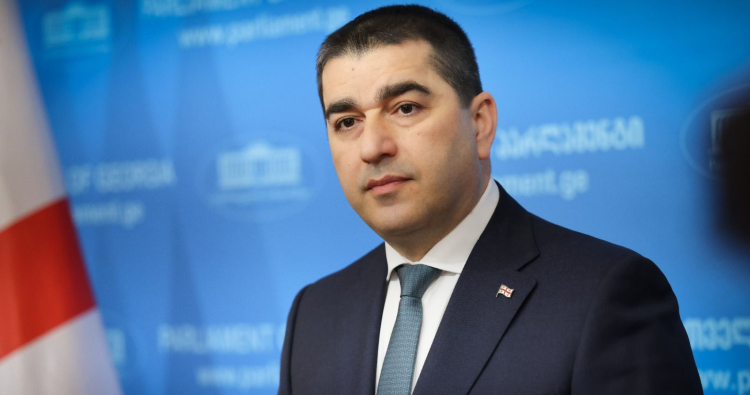Parliament Speaker says transparency bill “compatible with European human rights standards” in response to CoE Human Rights Commissioner

In his response, Papuashvili noted the bill was “proportionate to its legitimate aims” of seeking to address “foreign influence in a proportionate way” while “fully respecting fundamental rights”. Photo: Parliament of Georgia
Georgian Parliament Speaker Shalva Papuashvili on Tuesday said the domestic bill on transparency of foreign influence was “compatible with the European human rights standards does not restrict the freedom of association”, in response to comments by Michael O'Flaherty, the Commissioner for Human Rights of the Council of Europe, who last week expressed concerns about the draft law.
O’Flaherty had raised concerns about the bill’s compatibility with human rights standards in freedom of association and expression in a letter to Papuashvili, after the ruling Georgian Dream party reintroduced the legislative initiative following its retraction last year on the backdrop of public protests.
In his response, Papuashvili noted the bill was “proportionate to its legitimate aims” of seeking to address “foreign influence in a proportionate way” while “fully respecting fundamental rights”.
“We have duly studied the practice of the European Court of Human Rights and the Court of Justice of the European Union. The bill is based on these very principles. The judicial practice also strengthened our determination to introduce minimal and non-cumbersome obligation of an annual financial declaration [if their foreign funding is more than 20 percent of their income], which some non-profit organisations already voluntarily do via their web-pages”, the lawmaker said.
“The interference must be proportionate to the legitimate aim pursued. Therefore, the bill introduces the only obligation of an annual declaration of funding. Thus, the proposed legislation does not ban any type of activity, and does not and cannot seek to limit the civic space. Instead, it provides for transparency and accountability requirement applicable to non-profit organisations with considerable foreign funding”, he added.
No [individuals], no sports federations, no students, no scientists, no emigrants, no individual entrepreneurs, no commercial entities are subject to the law. This is the absolute minimal and proportionate interference, even compared to similar American, British, French or EU [draft] legislations on transparency and lobbying. There is no other lesser obligation on transparency in any other legal jurisdiction across the globe”, the official also noted.
The chief Georgian legislator said the issue of stigmatisation had been also addressed by swapping the original bill’s wording of “foreign agent” to refer to its subject organisations in favour of “organisation pursuing the interest of a foreign influence”.
“It resembles the EU’s wording ‘organisation carrying interest representation on behalf of third countries’ suggested in the European Commission’s proposal”, the Parliament Speaker said.
He also stressed the “only obligation” for non-profit organisations would be to provide their financial declaration annually, adding achieving “greater transparency” of the funding of elections and political processes was “one of the merits” of the proposed legislation.
Georgia has been subject to foreign invasion and manipulation of its politics for decades now. In the era of rising hybrid and informational warfare and geopolitical challenges, the lack of transparency of foreign interference leaves my country and society vulnerable”, he said in his response.
“Foreign funding of political parties is, as in other European countries, against the law in Georgia. However, on numerous occasions, shadow schemes of political party financing via NPO funding were identified that were not known to the state and the general public. The proposed legislation has certain mechanisms to expose and avoid such illegal linkages between the political parties and NPOs. This is especially relevant ahead of upcoming elections in Autumn 2024”, Papuashvili added.
The Parliament Speaker also highlighted the public could receive information on possible foreign funding of elections and political processes - which would become “more readily available” - to enable “informed political decision”, and further added “security of the state is not an abstraction but a tangible right of every citizen”.
The bill, in terms of its future consequences, will certainly have a positive effect on Georgian NPOs. The bill will raise the level of responsibility and accountability of NPOs. Thus, their legitimacy, which was shaken due to scandals with meddling in politics, will increase. So will do the trust towards them among the public”, he continued.
Papuashvili added these changes would “ameliorate the integrity” of the political and electoral system in Georgia and “allow more inclusive participation” of non-profit organisations in public policymaking.
He also claimed an “unfortunate reality” in Georgia was that “certain non-profit organisations continue to evade transparency requirements and covertly influence political, economic and security processes”, adding transparency of the organisations engaged in public policymaking was “always good and can only solidify democratic pillars of Georgia”.
 Tweet
Tweet  Share
Share